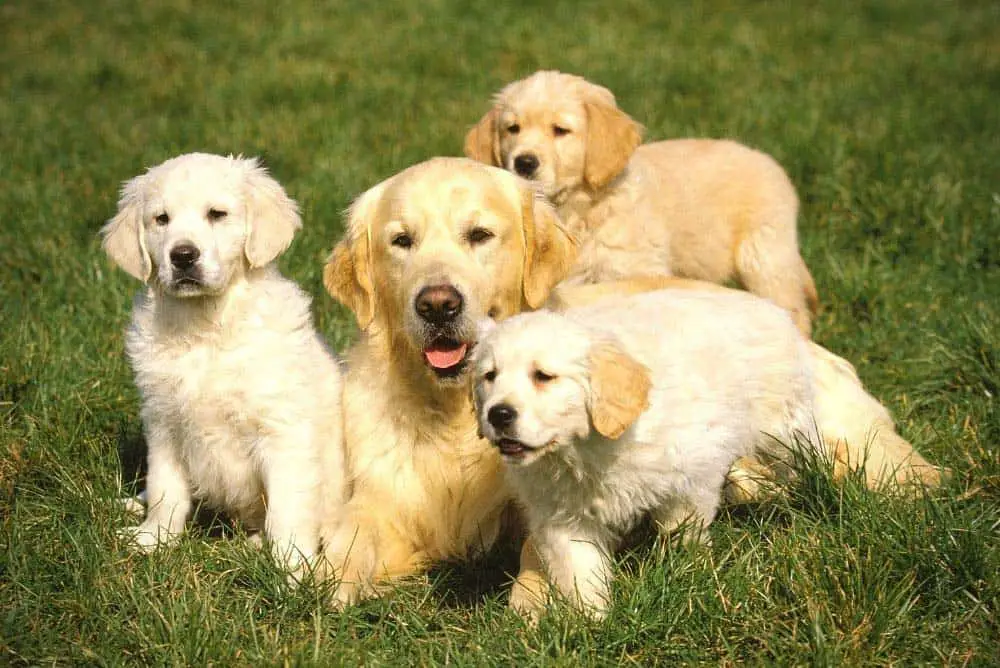It can be difficult to determine when owners should stop breeding their Golden Retrievers since dogs are fertile for life. However, there are some signs to look out for to determine when it is time to stop mating them. So, when is a Golden Retriever too old to breed?
Female Golden Retrievers are too old to breed at eight years of age. After eight, they are more likely to experience health issues, and kennel clubs will typically not register puppies born to mothers older than this. Males can keep breeding until their sperm is not viable, or they have health problems.
Below we’ll go over when Golden Retrievers are sexually mature, when they should be bred, and at what age they are too old to keep mating. We’ll then go over some additional signs owners can look for to determine whether or not their goldens should continue to breed.

(This article may contain affiliate links and loyalgoldens may earn a commission if a purchase is made.)
Unlock your goldens natural intelligence and see just how quickly problem behaviors disappear.This is the best at home dog training I've ever used!
When Are Golden Retrievers Sexually Mature?
In general, males become sexually mature earlier than females. Male goldens can reach sexual maturity anytime after they are 5 months old.
Female Golden Retrievers can reach sexual maturity as early as six months old, but it’s more common for them to go into heat when they’re older. Typically, their first heat will occur when they are 6 to 15 months old.
How Old Should a Female Golden Retriever Be To Breed?
A female Golden Retriever should be ready to breed when she is two years old. By this time, a female Golden has gone through two or three heat cycles, and she has reached prime breeding age.
Responsible breeders do not breed female goldens during their first heat. Females at this young age are still growing, so pregnancy is hard on their developing bodies. Plus, females need to be mature enough to feed and take care of their puppies.
It’s best to start mating female goldens after their second or third heat when they are closer to two years old. However, owners should always consult with their vet to make sure their goldens are old enough and healthy enough for breeding.
Additionally, female goldens should not be bred during consecutive heats. Constantly mating them will wear down their bodies and not give them the time they need to heal between pregnancies. It’s best to skip one heat cycle (or more) before attempting to impregnate them again.
Male goldens, on the other hand, can start breeding much earlier. Males do not have to feed or take care of the puppies, so their maturity level is not as important.
However, male dogs sometimes have problems producing enough semen if they are too young. They may also lack the experience they need to impregnate or not even be interested in having sexual relations.
Typically males become more fertile around 12-15 months of age, so it may be better to wait till then. Owners should contact a vet when their male goldens are sexually mature to determine if they are ready to breed.
How Old Is Too Old For Goldens to Breed?
Most kennel clubs would not accept an application to register a litter of puppies if the female was 8 years old or older at the time of breeding. For registering purposes, female goldens should not be bred after they turn eight years old.
As far as health goes, it depends on each dog’s health status to determine when to stop breeding. Most breeders retire their female goldens when they are 5-8 years old. Female dogs do not have menopause, so they can technically keep reproducing into old age. However, more health complications arise in older dogs, so it is unwise to keep breeding females over 8.
The guidelines for male goldens are less stringent. If studs are healthy, they can keep breeding for a long time. Healthy Golden Retriever males often remain fertile well into old age.
However, as males age, their sperm count goes down. It makes it harder for them to get females pregnant. Similarly, males can develop arthritis and other age-related conditions which makes it harder for them to mount females and impregnate them. Owners can visit their vet to check their stud’s sperm counts and overall health status to determine if they can still breed effectively.

What Are Some Other Signs Golden Retrievers Should Stop Breeding?
Other than their age, there are a few things owners should look out for to help them determine when it’s time for their goldens to stop breeding.
Female Golden Retrievers
Female goldens should stop breeding if they’ve already had 4-6 litters. They experience complications during pregnancy or start displaying health problems that harm them or that could be inherited by their puppies.
Had More than Four Litters
It is generally recommended that female goldens stop reproducing after they have four to six litters. Most vets recommend that females stop breeding after they have four litters, but some dogs may be able to have six safely.
Pet owners should consult their vet and look at their kennel club rules before deciding how many litters their goldens should have.
Pregnancy Complications
Some health conditions can become worse when dogs get pregnant. If females have any of these health issues, they should stop breeding:
- Diabetes
- Pyometra
- Hip dysplasia
Additionally, female dogs can have health problems during pregnancy. If female goldens experience any of these problems, it may be wise to stop breeding them. Sometimes the problem that occurs during one pregnancy can happen again in future pregnancies. These include:
- Having multiple miscarriages
- Having an unplanned c-section
- Prolonged labor and birth
If Goldens develop any of these problems or any other health issues, owners should stop breeding them immediately.
They Have Inheritable Health Issues
If golden retrievers display any inheritable health problems, they should not be allowed to mate since these conditions can be passed on to their puppies. Some of the most common inheritable conditions experienced by golden retrievers are blindness, hip dysplasia, and heart problems, such as aortic stenosis and dilated cardiomyopathy.
- Blindness is caused by many inheritable diseases, such as hereditary cataracts, glaucoma, and uveitis. All of these conditions are experienced regularly by Golden Retrievers.
- Hip dysplasia is another inheritable condition in which the hip joint does not form properly. This condition is often passed on from mothers to their puppies. If female dogs with hip dysplasia get pregnant, they may experience increased pain and problems in their hips due to the added weight from the puppies and the increased stress on their hips.
- Aortic stenosis is an inherited condition that makes it so the blood leaving the heart is partially obstructed. It makes the heart have to work harder to pump enough blood throughout the body.
- Dilated Cardiomyopathy (DCM) is a disease that makes the heart so weak that it cannot pump blood through the body. The cause of DCM is still undetermined, but it is ideal to be partially genetic.
Male Golden Retrievers
Male golden retrievers can reproduce into old age. However, as they get older, they are more likely to have trouble getting females pregnant. Here are some signs male golden owners can look out to determine if it is time to stop breeding.
Health Issues Arise
As with female goldens, if any health issues arise, male goldens should not allow mating. These include conditions that are harmful to the studs themselves or conditions that can pass from the males onto their offspring.
Goldens should always be checked at the vet before mating to ensure they are in tip-top shape. If they are not, it’s time to stop breeding.
Smaller Litter Size Than Before
If male dogs have stud multiple times, their owners should have a rough estimate of the number of puppies typically produced. While the female determines litter size, if studs have become less fertile, that can influence how many eggs get fertilized, thereby making the litter size smaller.
If the litter size goes down significantly, then male goldens may have a high amount of abnormal sperm or a low count of healthy sperm. While there are some potential treatment options for this, in some cases, it may be a sign that it is time for them to stop mating.
No Longer Interested in Mating
Sometimes, older male Golden Retrievers lose interest in mating. It’s often due to hormonal changes in their bodies, which can affect their sex drive. If this occurs, they may not want to do the deed with female dogs.
Discover how to train your Golden Retriever by playing games: 21 games to play with your Golden that will make them smarter and better behaved!
Conclusion
It’s recommended that female Golden Retrievers stop breeding when they reach eight years of age. After eight, health complications are more likely to arise. Additionally, most kennel clubs will not register puppies that were born to mothers who are eight years old or older.
Male Golden Retrievers can start breeding earlier and can continue to breed throughout their life. Males should stop breeding when they experience health problems, cannot get females pregnant, or are no longer interested in mating.
It’s always best for owners to contact their vet to make sure their goldens are healthy enough for breeding.
More Golden Retriever Articles You’ll Love!
- How Long Does A Golden Retriever Stay In Heat? (Heat Cycle)
- How to Care for a Pregnant Golden Retriever (A Complete Guide)
- Can You Breed a Golden Retriever With a Miniature Poodle? (Explained!)
- When Does a Golden Retriever Get Long Hair (at What Age?)
